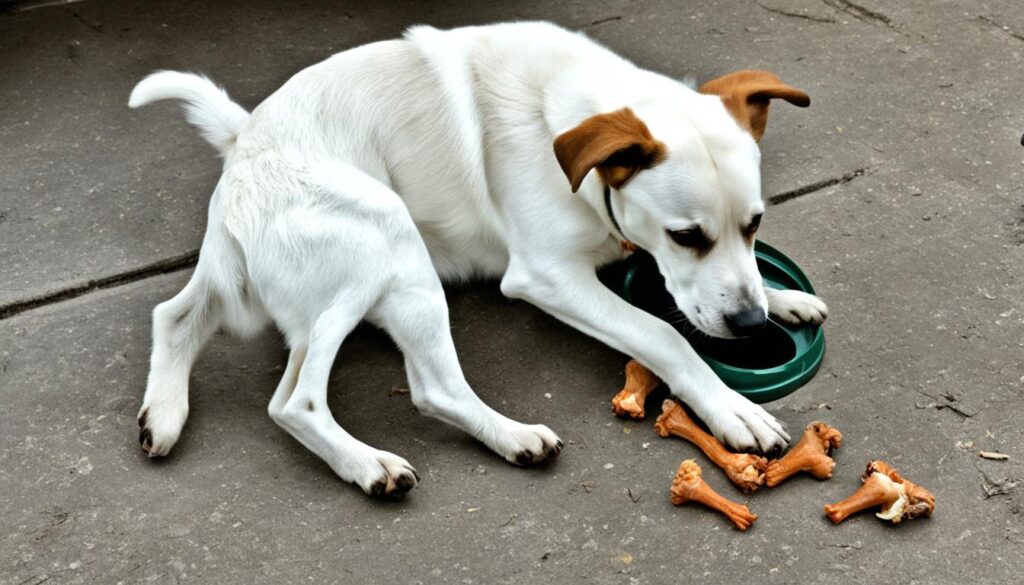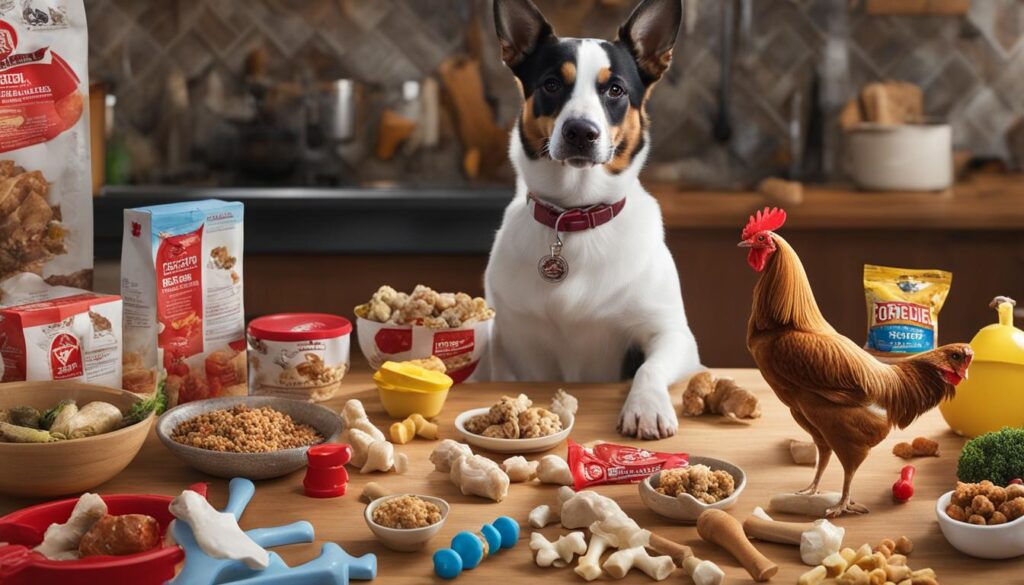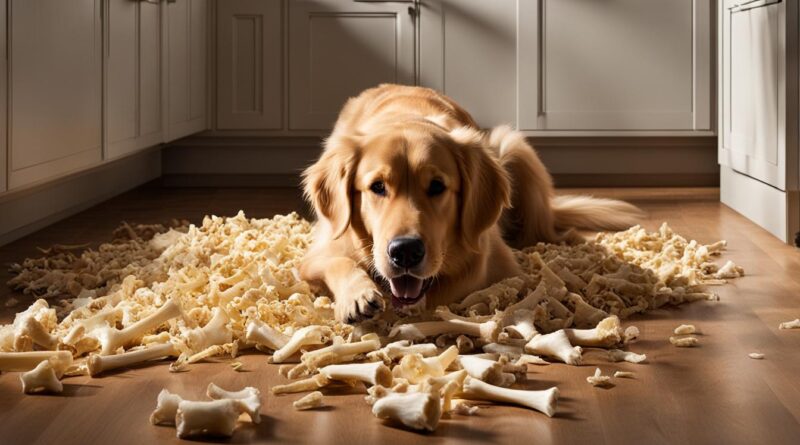Emergency Tips: If Your Dog Eats Chicken Bones, Here’s What You Need to Do
If your beloved furry friend has mistakenly ingested chicken bones, it’s crucial to act quickly and calmly. The safety and well-being of your dog are paramount, and taking immediate action can help prevent any potential health complications.
Dogs are naturally curious and may grab food without realizing the dangers it poses. Chicken bones, in particular, can be hazardous to dogs due to their tendency to splinter and cause injury. In this article, we will guide you through the necessary steps to ensure your dog’s emergency care in case of chicken bone ingestion and offer preventive measures to avoid such incidents in the future.
Key Takeaways:
- Take immediate action if your dog eats chicken bones to protect their health.
- Remain calm and try to remove the bone if your dog hasn’t fully swallowed it.
- Contact your veterinarian immediately for professional guidance.
- Watch for signs of chicken bone ingestion, such as vomiting, diarrhea, and abdominal pain.
- Veterinary treatment may involve monitoring, X-rays, and even surgery in severe cases.
- Prevent future incidents by keeping food out of reach and educating guests about the risks.
- Remember, cooked chicken bones are particularly dangerous and should be avoided.
What to Do if Your Dog Eats a Chicken Bone
Taking the right steps when your dog eats a chicken bone is crucial to minimize potential health risks. Remaining calm is the first priority in this situation. If your dog hasn’t completely swallowed the bone, attempt to remove it gently to prevent any further complications. However, it’s important to note that if your dog has already swallowed the bone without choking, it’s best not to induce vomiting or try to retrieve it as this could lead to additional harm.
After removing or confirming the bone has been swallowed, the next step is to contact your veterinarian immediately. Professional guidance is essential to ensure the well-being of your furry friend. Inform your veterinarian about the situation and follow their instructions carefully. They will provide you with specific advice tailored to your dog’s condition and may ask you to monitor their behavior for any signs of distress.
Remember, each situation may vary, and it’s important to seek veterinary assistance to ensure the proper care and treatment for your dog.
In the meantime, it’s crucial to monitor your dog closely for any signs of discomfort or distress, such as excessive drooling, difficulty swallowing, vomiting, diarrhea, abdominal pain, or changes in behavior. If you notice any of these symptoms or if you have any concerns, contact your veterinarian immediately for further evaluation.
“Taking the right steps when your dog eats a chicken bone is crucial to minimize potential health risks.”
Remember, if your dog eats a chicken bone, it’s always better to seek professional advice rather than attempting home remedies that might inadvertently cause more harm. Quick action and proper guidance from your veterinarian are key to ensuring the safety and well-being of your pet.
Signs of Chicken Bone Ingestion in Dogs
Dogs are known for their curious nature and tendency to explore their surroundings with their mouths. Unfortunately, this can sometimes lead to unexpected and dangerous situations, such as ingesting chicken bones. It is crucial for dog owners to be aware of the signs that indicate their furry friend may have ingested chicken bones, as prompt intervention is necessary to avoid potentially serious complications.
Vomiting and diarrhea: One of the most common signs of chicken bone ingestion in dogs is recurrent vomiting and diarrhea. If you notice your dog experiencing these symptoms, it could be a strong indication that they’ve swallowed chicken bones.
Loss of appetite: Another telltale sign is a sudden decrease in appetite. If your dog displays a lack of interest in their regular meals or treats, it may be because they have consumed chicken bones. A sudden loss of appetite should be taken seriously and prompt a visit to the veterinarian.
Constipation: Difficulty in passing stool or a prolonged absence of bowel movements may also point to chicken bone ingestion in dogs. If you notice your dog straining or showing signs of discomfort while trying to defecate, it’s essential to seek veterinary assistance.
Bloating and abdominal pain: Dogs that have ingested chicken bones may experience bloating and abdominal pain. This can manifest as a visibly distended belly, restlessness, or your dog showing signs of discomfort when their abdomen is touched. These symptoms should never be ignored, as they can indicate a potentially life-threatening condition.
If your dog displays any of these signs, it is crucial to seek immediate veterinary assistance. The dangers of dogs eating chicken bones cannot be overstated, and professional advice should be sought to ensure proper diagnosis and treatment. Remember, early intervention can make all the difference in preventing serious complications and safeguarding your furry friend’s health.

Common Signs of Chicken Bone Ingestion in Dogs
| Signs | Description |
|---|---|
| Vomiting and diarrhea | Recurrent episodes of throwing up and loose stools |
| Loss of appetite | Sudden decrease in interest and refusal to eat regular meals or treats |
| Constipation | Difficulty passing stool or prolonged absence of bowel movements |
| Bloating and abdominal pain | Visibly distended belly and signs of discomfort when the abdomen is touched |
Treating Chicken Bone Ingestion in Dogs
Proper treatment for chicken bone ingestion in dogs depends on the severity of the situation. If your dog has ingested chicken bones, it’s important to consult with a veterinarian for professional guidance and care.
In less severe cases, your veterinarian may recommend monitoring your dog’s behavior and watching for any signs of distress. It’s crucial to pay close attention to your dog’s stool for the presence of bone fragments. This can help determine if the bones have passed through the digestive tract.
In more serious cases, where the bones may pose a risk of obstruction or internal injuries, medical intervention such as X-rays may be necessary to assess the situation. Surgery might be required if the bones have caused blockage or perforation of the gastrointestinal tract.
It’s important to remember that attempting to induce vomiting or administering any home remedies without veterinary supervision can be dangerous and should be avoided. Your veterinarian will have the expertise to provide the most appropriate treatment for your dog’s specific situation.
Prevention Tips for Dogs Eating Chicken Bones
While it’s essential to know what to do if your dog eats a chicken bone, prevention is always better than dealing with the aftermath. By taking proactive measures, you can significantly reduce the chances of your dog getting their paws on these dangerous treats. Here are some prevention tips to keep in mind:
- Keep food out of reach: Dogs are natural scavengers, and they may be tempted to raid the trash or countertops for chicken bones. Make sure to securely store food, dispose of bones properly, and use childproof locks if necessary.
- Train your dog not to steal: Teaching your dog basic obedience commands such as “leave it” and “drop it” can come in handy when it comes to preventing them from snatching chicken bones or any other potentially harmful objects.
- Educate guests: Friends and family may not be aware of the dangers posed by chicken bones. Inform them about the risks and ask them to avoid sharing food, especially bones, with your dog.
- Supervise mealtime: Keep a watchful eye on your dog during meals to ensure they don’t try to grab any leftovers or bones. If you have multiple dogs, feed them separately to prevent competition and potential bone stealing.
- Provide safe alternatives: Satisfy your dog’s chewing instincts with appropriate and safe chew toys. This will help redirect their attention from seeking out chicken bones and keep them entertained.
By following these preventive measures, you can create a safer environment for your furry friend and minimize the risks associated with dogs eating chicken bones. Remember, a little awareness and carefulness can go a long way in protecting your dog’s health and well-being.

Why Are Cooked Chicken Bones Bad for Dogs?
Cooked chicken bones can pose serious dangers to dogs and should be avoided at all costs. When dogs consume cooked chicken bones, they put themselves at risk of various health complications. It is essential for dog owners to understand the hazards associated with dogs eating chicken bones and be prepared to take immediate action.
One of the primary reasons why cooked chicken bones are harmful to dogs is their propensity to splinter. Cooked bones become brittle and can easily break apart into sharp fragments when chewed on. These sharp edges can cause severe injuries to the dog’s mouth, airways, and gastrointestinal tract. The delicate tissues in these areas can be punctured or lacerated, leading to pain, bleeding, and potentially life-threatening internal damage.
In addition to physical injuries, the ingestion of cooked chicken bones can also result in other serious health issues. The fragments can cause blockages within the digestive system, leading to intestinal obstruction. This condition can cause abdominal pain, vomiting, and constipation. If left untreated, it can be fatal.
Another concern is the risk of pancreatitis. The fat content present in cooked chicken bones can trigger an inflammation of the pancreas in dogs. Pancreatitis can lead to severe abdominal pain, digestive issues, and other systemic complications.
Furthermore, cooked chicken bones can harbor harmful bacteria such as Salmonella. Dogs can become infected with these pathogens through the consumption of contaminated bones. Salmonella can cause gastrointestinal distress, including symptoms such as diarrhea, vomiting, and fever.
It is crucial for dog owners to be aware of these risks and take precautions to prevent dogs from accessing cooked chicken bones. Providing appropriate chew toys and keeping any potential sources of bones securely stored away can help mitigate the chances of accidental ingestion.
“Cooked chicken bones are a significant hazard for dogs, as they can splinter and cause severe injuries or blockages. It’s important to prioritize your dog’s safety and avoid exposing them to the risks associated with cooked chicken bones.”
If you suspect that your dog has consumed cooked chicken bones, it is essential to seek emergency care and consult with a veterinarian immediately. Professional guidance is crucial for evaluating the severity of the situation and determining the appropriate course of action. Remember, quick action can significantly improve the chances of a positive outcome for your beloved pet.
Can Dogs Eat Chicken Bones?
Dogs should not eat chicken bones, especially when they’re cooked. Cooked chicken bones are softer and more likely to splinter into small, sharp pieces, posing significant dangers to your furry friends. These bone fragments can cause choking hazards, puncture the digestive tract, and lead to other serious health issues. It’s crucial to keep cooked chicken bones away from your dog’s reach to prevent accidents and potential harm.
However, it’s important to note that even raw chicken bones carry their own set of risks. Raw bones can still splinter and cause injury, and there’s also a risk of salmonella poisoning. While some dog owners may argue that raw bones are safer for consumption, it’s always best to consult with your veterinarian to determine the most appropriate diet and feeding practices for your dog.
Maintain a safe environment for your dog by properly disposing of chicken bones and educating guests, especially children, about the dangers of dogs consuming these bones. By taking preventive measures, you can help ensure the health and well-being of your beloved pet.
The Dangers of Cooked Chicken Bones
“Cooked chicken bones can be extremely hazardous for dogs. The process of cooking makes the bones brittle and more likely to splinter, which can cause serious injuries if ingested.”
The Risk of Raw Chicken Bones
“While raw chicken bones are less likely to splinter, they still carry risks, including the potential for choking and the risk of salmonella poisoning, which can lead to severe illness in dogs.”
- Do not feed your dog cooked chicken bones.
- Keep raw chicken bones out of your dog’s reach.
- Dispose of chicken bones safely and securely.
- Educate guests about the dangers of dogs consuming chicken bones.
- Consult with your veterinarian to determine the best diet and feeding practices for your dog.
Conclusion
If your dog eats chicken bones, it’s crucial to take immediate action to ensure their safety and well-being. Stay calm and assess the situation carefully. Contact your veterinarian right away for professional guidance and advice. Remember to closely monitor your dog for any signs of distress or discomfort.
Prevention is key when it comes to dogs eating chicken bones. Take proactive measures to avoid such incidents in the future. Keep food out of reach and properly dispose of bones to prevent access. Train your dog not to steal food and educate others about the risks involved with chicken bone ingestion.
By following these steps and seeking veterinary assistance when needed, you can effectively handle situations where your dog has eaten chicken bones. Prioritizing your dog’s health and well-being is paramount, and taking immediate action can be crucial in preventing potential complications and ensuring a positive outcome.
FAQ
What should I do if my dog eats chicken bones?
If your dog has eaten chicken bones, it’s important to remain calm and take immediate action. Try to remove the bone if your dog hasn’t completely swallowed it. Contact your veterinarian immediately for further guidance.
What are the signs that my dog has ingested chicken bones?
Signs of chicken bone ingestion in dogs may include vomiting, diarrhea, loss of appetite, constipation, bloating, and abdominal pain. If you notice any of these symptoms, seek veterinary assistance right away.
How is chicken bone ingestion in dogs treated?
The treatment for chicken bone ingestion depends on the severity of the situation. Your veterinarian may recommend monitoring your dog’s behavior and checking for bone fragments in their stool. In more serious cases, medical intervention such as X-rays or surgery may be necessary.
How can I prevent my dog from eating chicken bones?
To prevent your dog from eating chicken bones in the future, take precautions like keeping food out of reach and properly disposing of bones. Train your dog not to steal food and educate guests about the risks. Being aware and proactive can help avoid potential accidents.
Why are cooked chicken bones bad for dogs?
Cooked chicken bones are dangerous for dogs because they can splinter and cause injury. The sharp edges of splintered bones can damage the mouth, airways, and gastrointestinal tract. Cooked bones also carry a risk of pancreatitis, blockage, and contamination with pathogens like Salmonella.
Can dogs eat chicken bones?
No, dogs should not eat chicken bones, especially when they’re cooked. Cooked chicken bones are softer and more likely to splinter into small, sharp pieces. This can lead to choking, puncturing of the digestive tract, and other serious health issues. Raw chicken bones also carry a risk of salmonella poisoning.

